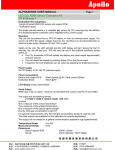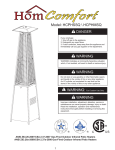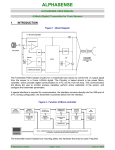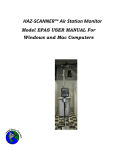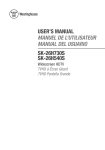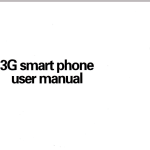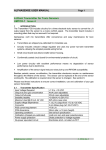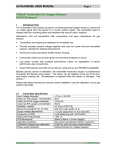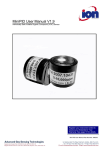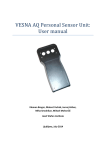Download HAZ-SCANNER EPAS User Manual
Transcript
Environmental Devices Corporation EPAS Manual Environmental Perimeter Air Station V. 3 For Window/PC and MacOS EPAS 1 Environmental Devices Corporation TABLE OF CONTENTS Setup 4 Introduction 4 Tripod 5 Solar Panel and Battery 7 Alarm 8 Wind 8 EPAS 9 Peripheral Sensors (optional) 9 Computer 9 Specifications 9 Insta"ation 9 EPAS 10 Features 10 Operation 10 Datalo#ing On 12 Datalo#ing Off 12 Alarms 12 Power Consideration 13 Particulate Sensor 13 Calibration 14 Reprogram Lo#er 15 Software CONNECTING TO HazScanner 15 15 Upload Data 16 View Current Data 16 Alarms 17 Advanced 18 VIEWING DATA View Uploaded Data EPAS 18 18 2 Environmental Devices Corporation Reports 20 Navigation 21 Find 21 Troubleshooting 22 Having trouble connecting 22 Creating a report 22 Power Off 22 Quick Start Sheet 23 Insta" So%ware 23 Start EPAS 23 Specifications 24 EPAS Overview 24 Carbon Monoxide (CO) 25 Carbon Dioxide (CO2) 26 Nitric Oxide (NO) 27 Nitrogen Dioxide (NO2) 28 Ozone (o3) 29 Particulates 30 Relative Humidity 30 Sulfur Dioxide (SO2) 31 Temperature 31 VOC’s 32 Wind Direction 33 Wind Speed 34 Air Velocity 35 Atomic Radiation 35 ELF 35 Light Intensity 35 Sound 35 Sample Reports 36 Data Export 36 Sensor report 39 Cover 42 Average period Report 43 Contact EPAS 44 3 Environmental Devices Corporation SETUP Introduction The portable HAZSCANNER™ EPAS wireless environmental perimeter air station is easily deployed as an ambient air quality monitor to measure and document critical U.S. EPA criteria pollutants including nitrogen dioxide, sulfur dioxide, ozone, carbon dioxide, particulates, VOCs, and more. The EPAS provides direct readings in real time with datalogging capabilities. Build your own station to provide up to 14 simultaneous critical air measurements in one battery-operated instrument. The HazScanner™ EPAS Monitoring System has been designed to provide accurate data through a simple, intuitive user interface. This manual will facilitate your ability to collect data with a minimum of effort. To analyze the data refer to the software manual. Don’t read manuals? Take a quick look at the Quick Start Sheet to get you up to speed quickly. 1. Wind (speed/direction) 2. High gain antenna (optional) 3. HazScanner EPAS Internal Gas Sensors •CO •SO2 •VOC •CO2 •NO2 •O3 •CH4 •special sensors available 4. Peripheral Monitors (optional) •Sound •Rain •Atomic Radiation •Solar Irradiance Each HazScanner system is manufactured according to the customer’s sensor specifications. Although individual systems may have different numbers of sensors attached, the software is self-configuring and determines which sensors are connected at any given time. NOTE: For data from any given sensor to be collected by the system, the sensor must be either connected and turned on before starting the HazScanner system, or you must press the sense button on the display panel. You cannot connect and new sensors while data logging. The logger is self-configuring and all relevant calibration data and other technical specifications are stored in battery-backed memory before each unit is shipped. Turning the system on and off has no effect on this data stored in memory; however, calibration settings are reset to factory settings when the machine is powered off and on. Environmental De- EPAS 4 Environmental Devices Corporation vices Corp. recommends annual factory calibration. The system is self zeroing. Several of the sensors, most notably the ELF meter air flow and light meter and the atomic radiation detector, can be disconnected and used independently of the HazScanner system. Of course, without being connected, these sensors will only display data on their built-in LCD displays; no data is stored in memory for later retrieval. The hand-held meters are normally mounted on tripod holders. Place holders in position before connecting the signal cable to the sensor and HazScanner. To disassemble, repeat these steps in the reverse order. These meters are turned on using their own switch and are powered by 9V replaceable batteries. See meter instructions for further information. Tripod Always select a level area with no obstructions overhead. 1.Loosen Lower Mast bolts and unfold Tripod legs. 2.Extend fully and tighten on lower mast pole. 3.Attach and anchor the feet of the tripod with provided anchors (spikes or screws). 4.Insert Mast (if needed) 5.Loosen upper mast nut. 6.Attach wind sensors and set the wind direction ‘North’ mark to north (see below). 7.Insert or raise mast and adjust height and tighten nut (keeping the wind sensor orientation). Beware of wires and other obstructions. 8.Insert pin to lock mast. EPAS 5 Environmental Devices Corporation 9.Attach battery shelf (if needed). 10.Attach lower solar panel bracket (see below). 11.Attach alarm (see below) 12.Loosen Handle clamp and adjust peripherals holder to desired height and tighten. 13.Note: All screws, nuts & bolts and handle must be tightened & secure before use. To prevent damage to Equipment. 14.Attach any peripheral sensors. 15.Attach the EPAS. Backup battery (Optional ) use a cinder block or other weight if you do not have the backup battery. Lower solar panel bracket 16.Connect all wires, including power, peripherals and wind to EPAS EPAS 6 Environmental Devices Corporation Solar Panel and Battery 1. 2. 3. 4. If the lower bracket is not attached attach it to two of the tripod legs. Tighten. Attach upper bracket to the mast using the clamps. Leave snug. Pull out the panel and attach with bolt to the lower bracket. Tighten top clamp on upper solar panel bracket. 5. 6. 7. 8. 9. Connect the coupling on the wire to the battery. Place the wire into the battery box. Put the cover on the battery box. Slide battery into place. Tighten the battery strap. EPAS 7 Environmental Devices Corporation Alarm 1. Attach alarm to the mast using the clamps. Attach alarm cable to panel 2. Line up notch on top of alarm plug to top of panel outlet on the side of the EPAS. Wind 1.Remove wind sensor from case. 2.Place sensor on top of mast. 3.Attach to mast with provided pin. 4.Line up notch on top of wind sensor plug to top of panel outlet on the side of the EPAS. 5.Push on and tighten. EPAS 8 Environmental Devices Corporation EPAS 1. Turn EPAS on if it is not on. It should be started at least 15 minutes before collecting data. Also turning it off resets alarms, limits and spans. 2. Scroll through the display and check sensors. 3. Make sure the Wind Status is on if the wind sensors are connected. Peripheral Sensors (optional) • Air Velocity Meter • Atomic Radiation Meter • ELF Meter • Light Intensity Meter • Sound Level Meter • Solar Irradiance • Precipitation (Rain) • Heat Stress (wet bulb/dry bulb/temp) Computer S P E C I F I C AT I O N S • • • • • • Windows XP, or Mac OS X 10.1 or higher. Hard disk with at least 10MB (megabytes) of free disk space 10MB of RAM (memory) PC Only: 1 available COMM port (port used for connecting a serial device) Mac Only: Serial port to USB converter Serial to USB adapter I N S TA L L AT I O N • Copy the contents of the CD to your Applications Folder • Make a copy of the folder ‘Uploads’ and put it on your desktop • Make sure your serial to USB adapter is installed and working EPAS 9 Environmental Devices Corporation EPAS Features Each EPAS system is manufactured according to the customer’s sensor specifications. Although individual systems may have different numbers of sensors attached, the software is self-configuring and determines which sensors are connected at any given time. ‘Plug and Play’, there is very little you need to know about the data logger in terms of its operation. You won’t have to set up the sensors on any specific channels or provide any technical data about the sensors. The logger is self-configuring and all relevant calibration data and other technical specifications are stored in battery-backed memory before each unit is shipped. Turning the system on and off has no effect on this data stored in memory; however, calibration settings are reset to factory settings when the machine is powered off and on. Environmental Devices Corp. recommends annual factory calibration. The EPAS has an exclusive self-zeroing feature and cycles on every 30 minutes. You can tell when this is happening because the pump will sound different. The selfzeroing operation takes a little under one minute. During this clean air purge, the sensor stores the last valid reading. The PM sensor with has the capability to measure 1.0 micron 4.0 micron, 2.5 micron or 10 micron particle sizes. TIP: If you want to collect data in more than one location, make sure you either upload the data in between or leave data logging on. If you stop logging you must upload the data before continuing. Operation Always select you location carefully. Setup the system and make sure it is secure. Before you start to log data the system is sampling every ten seconds. This can be useful to help you find a good location for data collection. EPAS 10 Environmental Devices Corporation 1. Make sure the main power is on. 2. Status Lights: • Sampling: blinks as the EPAS takes samples - if it is not blinking something is wrong. It blinks every 6-10 seconds when not logging and less frequently when logging. • Disk: blinks as it writes to the disk. • Logging: is on when you are datalogging. Always upload data before you start a new logging session. Turning logging ON will erase all previous data. • Power: is on when the system is powered. 3. The scroll buttons(3): scroll up or down to view the current sensor data. If you hold one of the scroll buttons down for 5 seconds the display will loop through all the sensors until you push it again. 4. Pushing the function button gives you commands that you can have the EPAS execute. (Log ON, Log OFF, Wind Status, Alarm Reset, Alarm Status) Push the scroll button (3) to view each option. 5. Enter: Push this to execute the command selected. EPAS 11 Environmental Devices Corporation D ATA L O G G I N G O N 1. 2. 3. 4. 5. 6. 7. 8. 9. 10. 11. Upload data from the EPAS if you have not done. Starting logging will erase all old data. Make sure all sensors are connected. Push the ‘Function’ button and scroll to the ‘Wind Status’ function. 1 is on and ‘0’ is off. If the sensors are not connected make sure this is off. Turn system on 20 - 30 before starting your session. Scroll through the display and verify that the values look reasonable. Push the ‘Function’ button. If needed use the scroll buttons to select function ‘LOG on’. Push the ‘Enter’ button. Scroll down the screen that reads record count. It should update after 1 minute. DO NOT DISCONNECT or CONNECT any sensors after starting datalogging. D ATA L O G G I N G O F F 1. 2. 3. 4. 5. If you are done logging. Before moving the system or disconnecting any sensors. Push the ‘Function’ button. If needed use the scroll buttons to select function ‘LOG on’. Push the ‘Enter’ button. DO NOT STOP LOGGING if you cannot upload data before you start another session. ALARMS To set alarms: 1. 2. 3. 4. 5. 6. 7. Connect with the HazScanner software. Push ‘Set Alarms’. Enter High limits for any sensor you want to trigger the alarm. (No. 1) Push ‘Turn Logger Alarms On’. (No. 2) Push ‘Set All Logger Alarms’. ( No. 3) See the Alarm section of the Software chapter for more details. DO NOT TURN THE SYSTEM OFF after setting the limits/alarms. EPAS 12 Environmental Devices Corporation 8. On logger using the function key, you can scroll and set ‘Alarm Reset’ which if the alarm has been triggered will turn it off. (if the condition returns it will go off again). You can also set ‘Alarm Status’ from 1 which is on to 0 which is off. This will turn all logger alarm functions in the logger off or on. 9. The logger alarm will turn off after 30 minutes to conserve power. Use ‘Alarm Status’ to reset. P OW E R C O N S I D E R AT I O N Charge Battery for 24 Hours. The average battery power run time is 20 hours depending on concentration and alarm conditions. The EPAS shuts off automatically when the internal battery voltage level falls below a preset value, data collection will cease in order to preserve data integrity. Data already collected will be saved. If this happens, you will need to connect the battery charger before retrieving the collected data. Furthermore, if you try to turn the system on and the main battery is below ~9.6 volts, the system will not turn on fully. Connect the charger immediately. When the external battery pack is plugged into the system the data collection time is quadrupled. Recharge this battery when not in use. P A RT I C U L AT E S E N S O R The PM sensor with the HazScanner has the capability to measure 1.0 micron 4.0 micron 2.5 micron or 10 micron particle sizes. You will find a small cylindrical piece in the Haz-Scanner case. These are called impactors. You can change the particle detection size by physically replacing the PM impactor . The PM10 impactor will detect a wider range of particle sizes than the PM2.5 impactor, or PM-4.0 impactor. Impactor sizes are labeled on the bottom of the Impactor. Occasionally, you should remove and grease the impactor. The impactor is located inside the Impactor sleeve . Remove Impactor by pushing up with pencil. Use just a small amount of Impactor grease. (P/N IG-105) Remove any excess before placing the impactor back into the sensor. EPAS 13 Environmental Devices Corporation C A L I B R AT I O N To calibrate the sensors: • Turn logger pump off. • Remove brass screw and put calibration barb in. Connect zero air or cal gas. • Ozone sensor is located on the right side above the connectors. • Connect to the HazScanner when not data logging. • Create a New Header. • Go to the ViewLoggerSensorOne layout. • Use the button next to the sensor to zero (1) or Span (2). • Always zero or set low point first. • When you select ‘Span’ a sensor you can set the 'Low point' or 'High point' for calibration. (figure 1 #1) When you select the low point, the sensor spans are adjusted to keep the slope of the calibration curve the same. When you set the high point, the slope is readjusted to the new reference. Always set the low point first when doing a full calibration. • Wait 5 minutes or more until the sensor value stabilizes (3). • Enter the value of your calibration gas in the dialog field (figure 2 #1) . Push set span. • The current sensor value will appear in the current field (3). It can take 30 seconds for the the sensor to stabilize. • Do not turn the system off, it will reset to factory spans. • To make your new span permanent reprogram logger and select the new span options. figure 1 EPAS figure 2 14 Environmental Devices Corporation REPROGRAM LOGGER From the Advanced layout select ‘Reprogram HazScanner’. This will make any calibration spans that you have made permanent. It cannot be undone. (see Advanced chapter below) SOFTWARE From the Main Screen you can either connect to the HazScanner or View Old Data, which views,generates and print reports. While connected you should not open old data. See chapter Quick Start Sheet for installation of the software (pg. 23). CONNECTING TO HazScanner To connect: 1. Turn the EPAS on and connect the serial cable or USB to serial adapter to the RS-232 port on the left side panel of the EPAS. 2. Your USB to serial adapter needs to be connected before starting your software. 3. Make sure the correct Port is selected on the Preferences Screen. 4. Connect the HazScanner to your computer. 5. Press the Connect button 6. You will be asked if want to use the the “current Header” or “create a new header”. (the first time through you have to create a new header) 7. A new header should be created if you have turned logging off since the last upload. (Otherwise the data in the file will not have a time gap) If you are not logging and there is no new data in the HazScanner you can use old header or you want to append the new data to the last upload. Under the view data section you will be told how to make reports from multiple headers. 8. Once connected there are three main functions: Upload Data, View Current Data (which includes setting and receiving alarms, and zeroing sensors), and Advanced. EPAS 15 Environmental Devices Corporation U P L OA D D ATA 1.Push the Upload Data button 2.Review and finish filling out the Header Data. 3.It is important to fill out the header info so you can recognize and find the data later. 4.Push the blue Continue button. V I E W C U R R E N T D ATA Push the View Current Data button If you are currently datalogging this will upload existing data. If you have a lot of data in the HazScanner, Upload the data before viewing. This screen will display the current values, average and maximum. You can set and view limits here by typing into the Hi Limit or Lo Limit fields. The background of a sensor will turn red if it has exceeded a High Limit limit. It will stay red even if the value goes down until you press the Alarm Reset button. If you click on an individual sensor it will take you to a screen that will a more detailed data summary and graph of that sensor. The information displayed here is all the data for the current header only. EPAS 16 Environmental Devices Corporation If you are not logging on this screen you can Zero or Span a sensor by selecting the button. If you are setting both a zero and a span. Do the zero first then the span. The zero function does not change the slope of the input/output ratio. The Span does. Use zero gas to zero sensors. After setting the zeroes and spans do not turn the system off. It will reset to factory settings. DO NOT DO UNLESS YOU ARE SURE. (see calibration chapter) The print button here is more designed for the report but you can print the current group (the button prints ALL sensors). To print an individual sensor from the layout menu go to the LoggerSensorsViewPrint layout first and then select print from the menu and choose ‘Current record’ to print just 1 graph. ALARMS There are 2 types of alarms. They are both based on the Hi limit or Lo limit fields on the View Sensor screens. The software alarm; if a limit is set and exceeded the background color of the sensor changes from blue to red. It remains red until you push the ‘Reset Alarm’ button on that sensor and it creates a line in the Sensor Alarm list at the top of the screen. Adding or changing a limit here does not send it to the logger. You must go to the ‘Set Alarm’ screen and send the new limit(s) to the logger. Logger Alarm. If you want to set the alarms in the logger: 1. 2. 3. 4. Push the ‘Set Alarm’ button. Push Button 4: ‘Clear all limits’ and enter what you want the new limits to be. Review the limits and change any that need to be changed. Button 3: ‘Set All Logger Alarms’ will reset all the limits in the logger to reflect the limits here. Button 5: ‘Set Logger Alarm’ will just set the limit for the selected sensor. 5. Button 1: Turns the master switch either on or off. Off will disable the logger alarm. 6. Button 2: ‘Clear Logger Alarm’ will turn off the current alarm in the logger. but still If another instance occurs the alarm will go off. If could happen right away. EPAS 17 Environmental Devices Corporation A D VA N C E D Use the screen to troubleshoot the system with Tech support. It is used to directly send commands to the HazScanner. If you have zeroed or set new spans on your sensors. 'Reprogram HazScanner' this will overwrite the factory setting and make it possible to turn the system off and have the new spans. If the spans in the Span List are the same as the beginning of the Program then the system is up to date. It is best to not use this and reset the zeros and spans before starting a new session and leaving the factory settings for the default. VIEWING DATA V I E W U P L OA D E D D ATA Disconnect, if you are connected to the HazScanner Option 1: (Best choice) • Push the View Old Data button • This will take you to a list of Headers (all data is associated with a header) • Press Select next to the data you want to view and create reports. • Press View Header to view or edit the header. This is the text that will export with the data and print with a report. You can edit it here. The sensor table sometimes needs tabs added or deleted to make things line up. To delete place cursor to the right of the tab and delete. To add a tab, you need to hold down the ‘Alt’ key and then push tab. (Just a tab takes you to the field) EPAS 18 Environmental Devices Corporation Option 2: • Select Data from the menu at the top • Push the Find icon. • You can then enter dates 1/1/2001..3/1/2001 • You can enter a known header # • You can them Perform Find, Constrain Found Set, or Extend Found Set. • If you enter data in 2 fields when you do a find it acts as an “and” statement. • entering 1/1/2001..3/1/2001 in the date field and 63 in the header field will only find records from header 63 during that time period. • You can use the New Request button and the find will act as a “or” find • you enter 1/1/2001..3/1/2001 in the date field • Push the New Request button and add 63 in the header field and the find will include all records either during 1/1/2001..3/1/2001 OR made with header 63 • Finds can be useful to group multiple uploads together for 1 report but usually option 1 will give all the data from 1 dataset. From the Data window you can push the Export Data button, this will export a tab delimited data file with a full header. You can print this or import the data into Excel (delimited data option) and start on the row with the sensor names. EPAS 19 Environmental Devices Corporation REPORTS • Select Report from the menu bar. • You can select an Average period for your report from the drop down list in the Report Ave field. • Then Push one of the buttons Sort, Daily Report, Average Report. • The Less Detail will now show the summary detail. • Export Data does the same thing as in the Data window. • Export Ave will export the summary based on the Report Ave period. If you want to export a daily average select 24 hours for your average period. The Sensor Report button (on the More Detail layout) will take you to a graphic report with a graph of each sensor with min, max and other information all based on the original data. This will not change by changing the average period. You can add limits here and leave the report and return to generate a report that gives % above high limits and below low limits. EPAS 20 Environmental Devices Corporation Navigation 1. 2. 3. 4. 5. 6. Main Menu buttons. Use these whenever possible. Action and navigation buttons Blue “Continue” button gives time to input data before the software continues. Zoom makes things fit better on your screen. Arrows take you from record to record. The Layout Menu. A quick way to go to different views. The status bar has different options. Number of records helps you know where you are (Logger, Logger Sensors, or Data) 7. The Preview button show how things will look when printed. Find This is one of the most powerful features of a database. It is worth spending a little time and learning how to find records you want. Multiple finds, constrained finds, extended finds and special characters (Operators) are all features you should become comfortable with. • Saved Finds. Your saved and recent finds are here. If you click and hold the arrow on the find icon. • Constrain Found Set. Performs the current Find in the current found set only. Removes them from the Found set • Extend Found Set. Performs the current Find in the omitted records only. Adds them to the Found set • Add New Request. Creates an OR find, finding both ‘Allan’ and ‘David’. • After performing a find, you use Omit Record to remove a single record from your found set or ‘Show Omitted Only’ will switch you to the omitted records found set. • When using the ‘Find’ tab on the summary screen. DO NOT select Find Mode. A script does the find for you. EPAS 21 Environmental Devices Corporation TROUBLESHOOTING H AV I N G TROUBLE CONNECTING 1.Are both computer and Haz-Scanner system turned on? 2.Is the communications cable securely fastened to both devices? 3.Have you installed the necessary software if you are using a serial to USB adaptor on either a Macintosh or a PC? 4.Did you have the USB to Serial plugged in before you started the software? 5.Have you tried restarting the Haz-Scanner and/or rebooted the computer? 6.Go to the Advanced screen and send ‘D’ and see if the date comes back. C R E AT I N G A REPORT 1.Make sure you are not connected to the logger. 2.Check the Header ID in the Header list layout and make sure there is data for it and that it is correct header that you want to view. You can also do a find in the data window to find the dataset you want. 3.Make sure you have sorted the data using the ‘Sort’ button or the menu. POWER OFF If logging has stopped and the indicators are off, you have probably drained the battery such that logging has been disabled. Place the power switch in the ‘Off’ position and immediately connect the charger to the system. Wait 45 minutes before trying to connect with the charger connected. EPAS 22 Environmental Devices Corporation QUICK START SHEET Start by collecting a small amount of data and then generating a report. If you are having problems, please contact technical support personnel who will be happy to get you up to speed. E-mail [email protected]. I N S T A L L S O F T WA R E Step 1: Copy the contents of the CD to your Applications Folder Step 2: Make a copy of the folder ‘Uploads’ and put it on your desktop Step 3: Make sure your serial to USB adapter is installed and working Note: Always make sure your USB to serial adapter is connected before launching the HazScanner software. Otherwise the port will not be available. START EPAS Step 1: Battery must be fully charged. (LED=Green) and System turned on at least 15 minutes prior to use. Connect to battery charger if necessary Step 2: To view sensor data on EPAS display, press up and down arrows to scroll through sensor list. Scroll through and see if values are as expected. Restart or check connections if needed. Step 3: To view sensor data on EPAS display, press up and down arrows to scroll through sensor list. Scroll through and see if values are as expected. Restart or check connections if needed. Step 4: To collect data, execute “logging on” function from display panel by pressing function button and then press enter button. This will erase all previous data. Upload old data if wanted. Do not select “Log On” if you have data you want and have not uploaded. Step 5: When done execute “logging off” function from display panel by pressing function button and then enter button OR by computer using serial cable and HazComm software. Step 6: To upload data connect to computer and using the HazComm software select “Upload Data” Step 7: To generate graphs and reports by computer refer to Hazcomm manual. Note: If you are connected to a computer and software use the commands from the software, DO NOT PUSH BUTTONS ON THE EPAS SCREEN. EPAS 23 !"#$%&'(%)*+,-.,+/00"1+,..2 Environmental Devices Corporation NER EPAS !"#$%$&&'()*"#+),$)-.%'/$#",$-$#'0"#'1-.-"+) SPECIFICATIONS Performance Profile EPAS O The HAZ-SCANNER EPAS is optimized for ambient air quality applications; custom calibration for specific ranges or applications V E R V Iis E W upon request. Build the station you need for your available application. !*&+18 9*2+.8*7*&,:#1&'*&,82,61&$;2&<* !"#$%&'("$)*++ ,-!./+/)0*1#2 !"#$%&'("$)*+,-.+/01#"#)2+$ '!,-!#(.(((!/012+!-3!(4('!,-!#((!2012+ =6<3,$!'2,,*86&< >28,6'/*$!6?*$;2&<* (4'!,-!'((!/2 >28,6'/*$!6?*$$ '!/2.!#4*!/2.!-3!$4(!/2!5)3(%)*'$+6! 9*2+.8*7*&, '(!/2!-3!789!50('*4'54+6 31("$%()+4#5"0%&+61781'09*+,346*2+++,-!./+/)0*1#2 >%@$ABC(D$*EF (!,-!'((!::2!50('*4'54+6 6"#:10+;%1<%9) ,-!./+/)0*1#2 G@%; (!,-!*(((!::2!5)3(%)*'$+6 =1<%&+>"*)*+,-()&$#1&?)7%&"(2++ ,-!./+/)0*1#*2 3453"#670+87079%2) (!,-!'((!::2!5)3(%)*'$+6 #HIJ9*,32&* (!,-!'((;!<-=4!5)3(%)*'$+6 :;2#7&"#670* (!,-!*(!::2!5)3(%)*'$+6+031&%78+9'0+(831+:;1*+ )5415%*96 GKL5<%$#7=)0+>%79%2) (!,-!*(((!::>!5(!,-!*!::26!5)3(%)*'$+6 KLJKMN<*& (!,-!*(;!<-=4!5)3(%)*'$+6 KOJK?1&* (!,-!'(((!::>!5(!,-!'!::26!5)3(%)*'$+6 !KL5?'(1'#+>%79%2) (!,-!*(((!::>!5(!,-!*!::26!5)3(%)*'$+6 4$?)#+!"#"7)$)#* ,-!./+@)$)#*2 ;26&$-2.<*$$ (!,-!*!?@ABCD!5)3(%)*'$+6 @A)"$)2B+$%CC%0=+6'&D)$E F)GC)#"$'#) %$!,-!'$(!E!5%#(!,-!F(!G6!50('*4'54+6 H)("$%I)+:'G%2%$;+@H:E (!,-!'((;!50('*4'54+6 ?7("#+/##"2%"0&) (!,-!'''!HI,,D!:C3!DJKI3C!2C,C3!5H12#6!5)3(%)*'$+6 ?7'02+"02+<7%*) +(!,-!'+*!LCA?>C=D!5LM6!5)3(%)*'$+6 J$7G%&+H"2%"$%70 '!,-!'&.&&&!A-K@,D!:C3!2?@K,C!5A:26!-3!(4(('!,-!! '((!2?=?NIL1B3!5)3(%)*'$+6 KLM+H"2%"$%70 '!,-!#((!2?==?0IKDD!52O6!5)3(%)*'$+6 N%02+?C))2O>%#)&$%70 (!,-!'#*!2:B1*!,-!+**!LC03CCD!50('*4'54+6 P2817*,86'$>8*++.8* #)!,-!+'!?@ABCD!P0!5)3(%)*'$+6 >)P+!7%0$+F)GC)#"$'#) %$"4#!,-!'##!E!5%$$!,-!*(!G6 N)$+Q'(6+F)GC)#"$'#) +4#!,-!'##E!5%'F!,-!*(!G6!5)3(%)*'$6)*1+<1(15+6 BCD+C!>@+0;):*+:%(;+)3(%)*'$+0)$'5+3'*1$0 ation ER EPAS wireless environmental perimeter air em. Contact SKC to build your own station. $,.*$0)(1-.$234&5/ *+$+'$+1.$!"#$2343+.($5-&&-6+7$-6($8.+)&6$9':3*7;$ ':.$:3-/3:3+7$-6($+1.$/)7.&>,$.?*:),3=.$&.4.(7@$A'$ 2343+.($5-&&-6+7$-6($8.+)&6$9':3*7;$B'$+'$1++%CDD 6+7@-,%@ :JR5?3J<<KH+K!J?+/0*$#'G)0$+?C)&%S&"$%70* >%*C("; QGR!3CI=!,?2C 4C)#"$%70 $%SCT!D:=IDB%:3--U!2C2>3I@C!DH?,AB >14*8 '#%<!V?WP!>I,,C3T 4C)#"$%0=+F%G) '(!B3D!5D,I@LI3L!>I,,C3T6.!A-@,?@K-KD!5XG6.!! -:,?-@I=!D-=I3!:I@C=D >%*C(";+8)"*'#)G)0$* WIY.!W?@.!7ZX.!87[Q H)&7#2%0=+F%G) '!DCA!,-!#'!HCCSD ?"GC(%0=+H"$) '!DCA.!'!2?@.!'(!2?@.!'!B3.!IL\KD,I>=C @2,2$!,182<* +F.(((!LI,I!:-?@,D ?"GC(%0=+!'GC '4(!,-!+4(!Q12?@ >%=%$"(+4'$C'$ N8%#+#!59G6.!N8%$#+!5WIA6 !10,428* 9G!-3!WIA?@,-DB @67*&+61&+$$ F!Y!'$!Y!'(!?@!5'*4#!Y!+*4F!Y!#*4$!A26 @P)"$A)#5C#771+&"*)E )*6<3, '#!=>D!5*4$!S06 4C)#"$%0=+F)GC)#"$'#) %$!,-!'$(!E!5%#(!,-!F(!G6 ?$7#"=)+F)GC)#"$'#) %$(!,-!'$(!E!5%$(!,-!F(!G6 :'G%2%$; &*;!@-@%A-@LC@D?@0!5KDC!?@=C,!BCI,C36 N%#)()**+H"2%7+872)G &((!WP]!5^4846.!)F)!WP]!5[K3-6!K:!,-!! '(!W?=CD!5)3(%)*'$+6 J'9%(%"#;+J0"(7=+/0C'$ (!,-!#4*!<RG!5'!ABI@@C=!U-3!I=,C3@I,?_C!2C,C36 !"#$%&'(!"#$%&$'%&"('!!!!!!!"#$)*+,!"'$%&&#%#")(!!!!!!!"#$-./0$#12+,!#)'%)*&%)(*(!!!!!!!"#$!1.,3!$+$%+*#%"'$& 444(+5'6&'('17 EPAS 24 &&6078+.7'9&1:07.;.7'3.*+ Environmental Devices Corporation All dimensions in millimetres (± 0.1 mm) Top View Bottom View Side View C A R B O N M(AOthree NO I D Eis available ( CO)on request, coded CO-DF) pinX version PERFORMANCE Sensitivity Response time Zero current Resolution Range Linearity Overgas limit nA/ppm in 400ppm CO 30 to 48 < 25 t90 (s) from zero to 400ppm CO % 22°C ppm equivalent in zero air <±3 RMS noise (ppm equivalent) < 1.5 ppm limit of performance warranty 1,000 ppm CO error at full scale, linear at zero and 400ppm CO ± 40 maximum ppm for stable response to gas pulse 2,000 LIFETIME ppm equivalent change/year in lab air % change/year in lab air, monthly test months until 80% original signal (24 month warranted) Zero drift Sensitivity drift Operating life ENVIRONMENTAL Sensitivity @ -20°C % (output @ -20°C/output @ 20°C) @ 400ppm CO Sensitivity @ 50°C % (output @ 50°C/output @ 20°C) @ 400ppm CO Zero @ -20°C ppm equivalent change from20°C Zero @ 50°C ppm equivalent change from 20°C CROSS SENSITIVITY Filter capacity H2S sensitivity NO2 sensitivity Cl2 sensitivity NO sensitivity SO2 sensitivity sensitivity H2 C2H4 sensitivity NH3 sensitivity KEY Temperature range SPECIFICATIONS Pressure range Humidity range Storage period Load resistor Weight ppm·hrs % measured gas @ 20ppm % measured gas @ 10ppm % measured gas @ 10ppm % measured gas @ 50ppm % measured gas @ 20ppm % measured gas @ 400ppm % measured gas @ 400ppm % measured gas @ 20ppm H2S H2 S NO2 Cl2 NO SO2 H2 C2 H 4 NH3 OC kPa %rh (see note below) months @ 3 to 20OC (stored in sealed pot) Ω (recommended) g < 0.5 <6 > 24 55 to 80 105 to 115 <±3 <±4 20,000 < 0.1 < 0.1 < 0.1 < 50 < 0.1 < 70 < 100 < 0.1 -20 to 50 80 to 120 15 to 90 6 10 to 47 <2 Note: Above 85% rh and 40OC a maximum continuous exposure period of 10 days is warranted. Where such exposure occurs the sensor will recover normal electrolyte volumes when allowed to rest at lower %rh and temperature levels for several days. At the end of the product’s life, do not dispose of any electronic sensor, component or instrument in the domestic waste, but contact the instrument manufacturer, Alphasense or its distributor for disposal instructions. NOTE: all sensors are tested at ambient environmental conditions, with 10 ohm load resistor, unless otherwise stated. As applications of use are outside our control, the information provided is given without legal responsibility. Customers should test under their own conditions, to ensure that the sensors are suitable for their own requirements. Alphasense Ltd, Sensor Technology House, 300 Avenue West, Skyline 120, Great Notley. CM77 7AA. UK Telephone: +44 (0) 1376 556 700 Fax: +44 (0) 1376 335 899 E-mail: [email protected] Website: www.alphasense.com EPAS 25 Environmental Devices Corporation C A R B O N D I O X I D E ( CO2) EPAS 26 &&6-*7/'*38&.9-*':'*3('1 Environmental Devices Corporation All dimensions in millimetres (± 0.1mm) N I T R I C Top O View X I D E ( NO) Bottom View Side View PERFORMANCE Sensitivity Response time Zero current Resolution Range Linearity Overgas limit nA/ppm in 40ppm NO t90 (s) from zero to 40ppm NO ppm equivalent in zero air RMS noise (ppm equivalent) ppm limit of performance warranty ppm error at full scale, linear at zero and 40ppm NO maximum ppm for stable response to gas pulse 500 to 750 < 10 0 to 1 < 0.1 100 < ± 1.5 200 LIFETIME ppm equivalent change/year in lab air % change/month in lab air, monthly test months until 80% original signal (24 month warranted) < 0.4 <5 > 24 Zero drift Sensitivity drift Operating life ENVIRONMENTAL Sensitivity @ -20°C % (output @ -20°C/output @ 20°C) 40ppm NO Sensitivity @ 50°C % (output @ 50°C/output @ 20°C) 40ppm NO Zero @ -20°C ppm equivalent change from 20°C Zero @ 50°C ppm equivalent change from 20°C CROSS SENSITIVITY H2S NO2 Cl2 SO2 CO H2 C2H4 NH3 CO2 sensitivity sensitivity sensitivity sensitivity sensitivity sensitivity sensitivity sensitivity sensitivity KEY Temperature range SPECIFICATIONS Pressure range Humidity range Storage period Bias voltage Load resistor Weight 65 to 85 102 to 115 < ± 0.5 3 to 6 % measured gas @ 20ppm H2S % measured gas @ 10ppm NO2 % measured gas @ 10ppm Cl2 % measured gas @ 10ppm SO2 % measured gas @ 400ppm CO % measured gas @ 400ppm H2 % measured gas @ 1000ppm C2H4 % measured gas @ 20ppm NH3 % measured gas @ 5% CO2 OC kPa %rh (see note below) months @ 3 to 20OC (stored in sealed pot) mV (working electrode above ground) Ω (for optimum performance) g < 30 <5 <5 <3 < 0.1 < 0.1 < 0.1 < 0.1 < 0.1 -20 to 50 80 to 120 15 to 90 6 300mV 10 to 47 <2 At the end of the product’s life, do not dispose of any electronic sensor, component or instrument in the domestic waste, but contact the instrument manufacturer, Alphasense or its distributor for disposal instructions. NOTE: all sensors are tested at ambient environmental conditions, with 10 ohm load resistor, unless otherwise stated. As applications of use are outside our control, the information provided is given without legal responsibility. Customers should test under their own conditions, to ensure that the sensors are suitable for their own requirements. Alphasense Ltd, Sensor Technology House, 300 Avenue West, Skyline 120, Great Notley. CM77 7AA. UK Telephone: +44 (0) 1376 556 700 Fax: +44 (0) 1376 335 899 E-mail: [email protected] Website: www.alphasense.com EPAS 27 ''7-89.(84:'1;-8(<(84)(+ Environmental Devices Corporation in millimetres (±0.1) N I T R O G E N D I O X AllI dimensions D E ( NO2) Top View Bottom View Side View PERFORMANCE Sensitivity Response time Zero current Resolution Range Linearity Overgas limit nA/ppm in 10ppm NO2 -200 to -400 t90 (s) from zero to 10ppm NO2 < 25 ppm equivalent in zero air ± 0.35 RMS noise (ppm equivalent) 0.1 20 ppm NO2 limit of performance warranty ppm error at full scale, linear at zero and 10ppm NO2 0 to -0.6 maximum ppm for stable response to gas pulse 60 LIFETIME ppm equivalent change/year in lab air % change/month in lab air, twice monthly test months until 80% original signal (24 month warranted) Zero drift Sensitivity drift Operating life ENVIRONMENTALSensitivity @ -20°C % (output @ -20°C/output @ 20°C) @ 10ppm Sensitivity @ 50°C % (output @ 50°C/output @ 20°C) @ 10ppm Zero @ -20°C ppm equivalent change from 20°C Zero @ 50°C ppm equivalent change from 20°C CROSS SENSITIVITY H2S CL2 NO SO2 CO H2 C2H4 NH3 CO2 sensitivity % measured gas @ 20ppm sensitivity % measured gas @ 10ppm sensitivity % measured gas @ 50ppm sensitivity % measured gas @ 20ppm sensitivity % measured gas @ 400ppm sensitivity % measured gas @ 400ppm sensitivity % measured gas @ 400ppm sensitivity % measured gas @ 20ppm sensitivity % measured gas @ 10% KEY Temperature range SPECIFICATIONS Pressure range Humidity range Storage period Load resistor Weight nd nd > 24 80 to 95 95 to 105 <± 0.6 <± 0.5 H2S CL2 NO SO2 CO H2 C2 H 4 NH3 CO2 OC kPa %rh (see note below) months @ 3 to 20OC (stored in sealed pot) Ω (for optimum performance) g < -20 < 80 < 0.5 <1 < 0.1 < 0.1 <0.1 < 0.1 <0.1 -20 to 50 80 to 120 15 to 90 6 33 <2 Note: Above 85% rh and 40OC a maximum continuous exposure period of 10 days is warranted. Where such exposure occurs the sensor will recover normal electrolyte volumes when allowed to rest at lower %rh and temperature levels for several days. At the end of the product’s life, do not dispose of any electronic sensor, component or instrument in the domestic waste, but contact the instrument manufacturer, Alphasense or its distributor for disposal instructions. NOTE: all sensors tested and stored at ambient environments unless otherwise stated. As applications of use are outside our control, the information provided is given without legal responsibility. Customers should test under their own conditions, to ensure that the sensors are suitable for their own requirements. Alphasense Ltd, Sensor Technology House, 300 Avenue West, Skyline 120, Great Notley. CM77 7AA. UK Telephone: +44 (0) 1376 556 700 Fax: +44 (0) 1376 335 899 E-mail: [email protected] Website: www.alphasense.com EPAS 28 Environmental Devices Corporation OZONE (O3) EPAS 29 Environmental Devices Corporation P A RT I C U L AT E S • Operation: Four key splash proof membrane switch – menu driven • Calibration: Gravimetric reference NIST Traceable - SAE fine test dust-ISO12103-1 Accuracy: ± 10% to filter gravimetric SAE fine test dust • Sensing range: .001-20.0 mg/m3 or optional .01-200.0 mg/m3 or .1-2000.0 mg/m3 • Particle size range: .1 – 100μm • Precision: ± .003 mg/m3 (3µg/m3) • Sampling flow rate: 2.0 liters/minute • Analog output: 0-2 vdc • Power: Rechargeable and interchangeable battery • Operating temperature: -10°C to 50°C • Storage temperature: -20°C to 70°C • Humidity: 95% non-condensing !"#$%&'()*+*",-.,/012/,*034*5,60178,*!2-74719*#:426,* * ;(;<"5=<>(*<!>5><";5=?"=<?** R>"4?;'@,A*B5?'BC8A*D E L A T I V EE$#!*FGH355*9IJ3K0L53*5I4I3CM* HUMIDITY ( !2-74719*<H0/0I1,/7G17IG* !F2LCLI:*#345FKLGT*D4GT3* D3H4ILW3*!F2LCLI:*N88FK48:*>$-*I9*P'Q*D!M* YF77H:*B9HI4T3** [92LG4H*\FI7FI*]''QD!*>4I*'BC8M* ,FKK3GI*,9G5F27IL9G* "3273K4IFK3*,93OOL8L3GI*>$-*I9*'-@,M* NW3K4T3*Y3G5LILWLI:*OK92*&&Q*I9*%'QD!* YLG`*,FKK3GI*,474VLHLI:*>D(*?*&&`!M* D389W3K:*"L23*4OI3K*$'-*J9FK5*9O*89GC3G54IL9G* !F2LCLI:*!:5I3K35L5* !F2LCLI:*D359HFIL9G* (9GT*"3K2*YI4VLHLI:* >$M "L23*,9G5I4GI*>4I*_&Q*9O*5LTG4HA*5I4IL8M*&&Q*I9*%'QD!* * \FI7FI*^273C4G83* c4K2*d7*"L23* >$M* ?9-J:6* D!* D!* B5* B9FI* ^8* "88* "B9FI="D!* ^* IK* * * "* "* b* Ic* #73* -* * Z1%'* ;1Z;* * * * * * * * * * * * "9.* * X=6&* '1--* ;1Z<* ;1<* 6-1-'* X;_* * $-* X=6$* -1Z* X=6-1'* '* %-* ;--* #0K* $--* X=6'* '1;'* ;1'Z* Z* 6-1$* * $'-* * * * * $-* * * D371* QD!* QD!* BC8* B* 2N* QD!=@,* 2B=QD!* aN* 5* QD!* QD!* QD!=:K* 5* !* 25* #73* * &_--* 6&-* * * * "9.* $-* &%&-* * ;* &* $-* #0K* * &<--* <-* &* * * D371* `!* * @,* Q* Q* 5* NI*;2=5*4LK*OH90* >"4?;'@,M* ",-.,/012/,*<H0/0I1,/7G17IG* [92LG4H*D35L5I4G83*];'@,* e3I4*W4HF3f*e;'=$--* "3273K4IFK3*#345FKLGT*D4GT3* [92LG4H*D35L5I4G83*"9H3K4G83*];'@,* e3I4*B4HF3*"9H3K4G83* D3579G53*"L23* ?9-J:6* D* #* "4* D[* #* "* * "@A=<>(*A;5)B5#>C<;*<D5E;?* !D#=F="@*?;C?B5* * !* #,0G2/,-,31*<:34717:3G* EPAS * * !"#$%&'()* L5* 5738LOL3C* O9K* 2345FK323GI5*0LIJLG*$-*I9*P'*QD!1* 30 488FK4I3* !!"#$%&'$()!*+#$','$(-' Environmental Devices Corporation All dimensions in millimetres (± 0.1mm) S U L F U R Top D IView O X I D E ( SO2)Bottom View Side View PERFORMANCE Sensitivity Response time Zero current Resolution Range Linearity Overgas limit nA/ppm in 10ppm SO2 t90 (s) from zero to 10ppm SO2 ppm equivalent in zero air RMS noise (ppm equivalent) ppm limit of performance warranty ppm error at full scale, linear at zero and 10ppm maximum ppm for stable response to gas pulse LIFETIME ppm equivalent change/year in lab air % change/year in lab air, monthly test months until 80% original signal (24 month warranted) Zero drift Sensitivity drift Operating life ENVIRONMENTAL Sensitivity @ -20°C % (output @ -20°C/output @ 20°C) 10ppm Sensitivity @ 50°C % (output @ 50°C/output @ 20°C) 10ppm Zero @ -20°C ppm equivalent change from 20°C !"#$%&'()*+*",-.,/012/,*034*5,60178,*!2-74719*#:426,* Zero @ 50°C ppm equivalent change from 20°C * % measured gas @ 20ppm CROSS H2S sensitivity ;(;<"5=<>(*<!>5><";5=?"=<?** % measured gas @ 10ppm SENSITIVITY NO2 sensitivity sensitivity % measured gas @ 10ppm Cl2 >"4?;'@,A*B5?'BC8A*D(E$#!*FGH355*9IJ3K0L53*5I4I3CM* NO sensitivity % measured gas @ 50ppm !2-74719*<H0/0I1,/7G17IG* ?9-J:6* CO sensitivity % measured gas @ 400ppm !F2LCLI:*#345FKLGT*D4GT3* D!* sensitivity % measured gas @ 400ppm H2 D3H4ILW3*!F2LCLI:*N88FK48:*>$-*I9*P'Q*D!M* D!* % measured gas @ 400ppm C2H4 sensitivity YF77H:*B9HI4T3** B5* % measured gas @ 20ppm NH3 sensitivity [92LG4H*\FI7FI*]''QD!*>4I*'BC8M* B9FI* % measured gas @ 10% CO2 sensitivity 180 to 350 <12 <± 0.2 <0.2 20 <5 50 <0.2 <6 >24 72 to 88 74 to 90 <± 1 <- 0.5 to 1.5 H2 S NO2 Cl2 NO #73* CO -* H2 * C2Z1%'* H4 NH;1Z;* 3 CO2 <-350 <-100 <-100 <1 D371* <-0.2 QD!* <1 QD!* <3 BC8* <0.1 B* <0.1 "9.* #0K* * $--* X=6&* X=6'* '1--* '1;'* ;1Z<* ;1'Z* ,FKK3GI*,9G5F27IL9G* ^8* * ;1<* Z* 2N* "3273K4IFK3*,93OOL8L3GI*>$-*I9*'-@,M* "88* * 6-1-'* 6-1$* QD!=@,* -20 to 50 KEY Temperature range OC NW3K4T3*Y3G5LILWLI:*OK92*&&Q*I9*%'QD!* "B9FI="D!* * X;_* * 2B=QD!* SPECIFICATIONS Pressure range kPa 80 to 120 YLG`*,FKK3GI*,474VLHLI:*>D(*?*&&`!M* ^* * * $'-* aN* Humidity range %rh (see note below) 15 to 90 D389W3K:*"L23*4OI3K*$'-*J9FK5*9O*89GC3G54IL9G* IK* * $-* * 5* 6 Storage period months @ 3 to 20OC (stored in sealed pot) !F2LCLI:*!:5I3K35L5* * * X=6$* * QD!* Load resistor Ω (for optimum performance) 22 !F2LCLI:*D359HFIL9G* * * -1Z* * QD!* Weight g <2 (9GT*"3K2*YI4VLHLI:* "* * X=6-1'* * QD!=:K* >$M "L23*,9G5I4GI*>4I*_&Q*9O*5LTG4HA*5I4IL8M*&&Q*I9*%'QD!* * * '* $-* 5* "* \FI7FI*^273C4G83* b* * %-* * !* At the end of the product’s life, do not dispose of any electronic sensor, component or instrument in the domestic waste, but contact the instrument manufacturer, Alphasense or its distributor for disposal instructions. c4K2*d7*"L23* Ic* * ;--* * 25* T E M P NI*;2=5*4LK*OH90* E R AT U R E >$M* >"4?;'@,M* NOTE: all sensors are tested at ambient environmental conditions, with 10 ohm load resistor, unless otherwise stated. As applications of use are outside our control, the information provided is given without legal responsibility. Customers should test under their own conditions, to ensure that the sensors are suitable for their own ",-.,/012/,*<H0/0I1,/7G17IG* ?9-J:6* #73* "9.* #0K* D371* requirements. [92LG4H*D35L5I4G83*];'@,* D* * $-* * Alphasense Ltd, Sensor Technology House, 300 Avenue West, Skyline 120, Great Notley. CM77 7AA. UK e3I4*W4HF3f*e;'=$--* #* &_--* &%&-* &<--* Telephone: +44 (0) 1376 556 700 Fax: +44 (0) 1376 335 899 E-mail: [email protected] Website: www.alphasense.com "3273K4IFK3*#345FKLGT*D4GT3* "4* 6&-* * <-* [92LG4H*D35L5I4G83*"9H3K4G83*];'@,* D[* * ;* &* e3I4*B4HF3*"9H3K4G83* #* * &* * D3579G53*"L23* * $-* * "* `!* * @,* Q* Q* 5* * "@A=<>(*A;5)B5#>C<;*<D5E;?* !D#=F="@*?;C?B5* * !* #,0G2/,-,31*<:34717:3G* * * !"#$%&'()* L5* 5738LOL3C* O9K* 488FK4I3* EPAS 2345FK323GI5*0LIJLG*$-*I9*P'*QD!1* * RS8FK5L9G*9FI* 9O*IJL5*K4GT3*>U*$-Q*9K*E* P'Q*D!A* LG8HFCLGT* 89GC3G54IL9GM* C935* G9I* 4OO38I* IJ3* K3HL4VLHLI:*9O*!"#$%&'()*8J4K48I3KL5IL85* 31 Environmental Devices Corporation VOC’S EPAS 32 Environmental Devices Corporation WIND DIRECTION EPAS 33 Environmental Devices Corporation WIND SPEED EPAS 34 Environmental Devices Corporation AIR VELOCITY The Anemometer utilizes a rotary valve movement to measure both high and low air velocit ies. The meter is capable of providing multi-functional air flow measurements. (see separate operations manual) when connected via the signal cable to the HazScanner set meter to ft/ min scale to correspond with logger calibration and repeat results consistent with ASHRAE convention. A T O M I C R A D I AT I O N The atomic radiation sensor is a simple Geiger counter that responds to alpha, beta and gamma radiation. Alpha radiation is easily blocked so care must be taken that nothing comes between the air being measured and the mica detection window. When an ionizing particle passes through the window, it is detected by a GeigerMueller (GM) tube, a cylindrical tube with a sealed gas and a thin central wire that is held at a high voltage. When radiation interacts with the tube, it will produce an energetic electron that is then counted. The output is the number of electrons detected over a period of one minute. ELF Radiation in the 0 - 200 mG range. The ELF sensor utilizes a single-axis probe; before placing the probe at given location, the probe must be oriented along each axis, X, Y, and Z, to determine the maximum reading and then left in that position for the duration of the logging session. LIGHT INTENSITY Utilizes a photodiode with color correction filter to measure Indoor Lighting. (see separate o peration manual) when connected via the signal cable to the HazScanner set meter measure ment scale to 1999 foot cable (fc) range to correspond with logger calibration and report res ults consistent with ASHRAE convention. SOUND This sound level meter has been designed to meet the measurement requirements of Safety Engineers, Health, Industrial Safety Offices and Sound Quality Control in various environm ents. This unit conforms to the IEC651 type2, ANSI S1.4 Type 2 for Sound Level Meters. Ran ges from 30dB to 130dB at frequencies between 31.5Hz and 8KHz. Display with 0.1dB steps on a 4‐digit LCD. Two equivalent weighted sound pressure levels A and C. EPAS 35 Environmental Devices Corporation SAMPLE REPORTS D ATA E X P O RT ENVIRONMENTAL REPORT Session location: Northeast Session site: Medium Town Organizational affiliation: EDC Session environment: Outdoors Session type: Ambient Session environment: Session Description: Test Logger Serial Number: 201101 Logging began on: 1/28/2011 12:39:26 PM Logging stopped on: 1/28/2011 4:13:37 PM Data uploaded on: 1/28/2011 4:15:25 PM Samples were averaged and saved every: 1 Minute Report was averaged: 1 Hour Total samples in this upload: 180 Memory remaining: 9776 SENSOR UNITS LO LIM HI LIM ------------------------------------------------------------------------------------Carbon Dioxide ppm 750 300 Carbon Monoxide ppm * * Nitrogen Dioxide ppb * * Nitric Oxide ppb * * Particulates uG/m3 * * Relative Humidity % * * Temperature Deg. F * * VOCS ppm * * Supply Voltage V * * * indicates no limit was set Data collected by: Allan City: Plaistow State: NH Country: USA Longitude: Deg. Min. W Latitude: Deg. Min. N Elevation: Date 1/28/11 1/28/11 1/28/11 1/28/11 1/28/11 1/28/11 1/28/11 1/28/11 1/28/11 1/28/11 1/28/11 1/28/11 1/28/11 1/28/11 1/28/11 1/28/11 1/28/11 1/28/11 1/28/11 1/28/11 1/28/11 1/28/11 1/28/11 1/28/11 1/28/11 1/28/11 1/28/11 1/28/11 1/28/11 1/28/11 1/28/11 1/28/11 1/28/11 1/28/11 1/28/11 1/28/11 1/28/11 1/28/11 1/28/11 1/28/11 EPAS Time CO2 12:39:26 12:40:26 12:41:26 12:42:26 12:43:26 12:44:26 12:45:26 12:46:26 12:47:26 12:48:26 12:49:26 12:50:27 12:51:26 12:52:26 12:53:26 12:54:26 12:55:26 12:56:26 12:57:26 12:58:26 12:59:26 13:00:27 13:01:27 13:02:26 13:03:27 13:04:26 13:05:26 13:07:26 13:08:27 13:09:26 13:10:26 13:11:26 13:12:26 13:13:27 13:14:26 13:15:26 13:16:27 13:18:26 13:19:26 13:20:26 CO 727 727 727 727 727 726 727 727 727 726 727 727 727 727 727 727 727 727 727 726 726 726 727 726 727 727 726 726 726 810 814 814 901 814 814 814 814 814 814 814 NO2 0 0 0 0 0 0 0 0 0 0 0 0 0 0 0 0 0 0 0 0 0 0 0 0 0 0 0 0 0 0 0 0 0 0 0 0 0 0 0 0 NO 0 0 0 0 0 0 0 0 0 0 0 0 0 0 0 0 0 0 0 0 0 0 0 0 0 0 0 0 0 0 0 0 0 0 0 0 0 0 0 0 Part 38.33 38.13 37.19 35.72 34.75 33.76 33.27 32.21 31.39 30.65 29.91 29.37 29 28.18 27.34 26.63 26.39 25.69 24.96 24.51 23.95 23.63 23.57 23.18 22.62 22.34 22.1 21.28 21.04 20.59 0 108.93 108.97 102.23 102.23 102.23 102.23 102.23 102.23 102.23 RH 21 14 13 25 20 19 19 20 15 20 21 22 20 25 27 22 24 31 24 24 29 31 22 26 25 24 25 24 24 24 11 12 7 10 12 7 10 9 11 9 Temp. 13 13 14 14 14 14 13 13 13 13 13 13 13 13 13 13 14 13 13 13 13 13 13 14 14 14 14 16 16 16 16 13 14 14 14 14 14 14 14 14 VOC 71.7 71.7 71.7 71.7 71.6 71.6 71.6 71.6 71.5 71.5 71.5 71.4 71.4 71.4 71.4 71.3 71.3 71.3 71.3 71.2 71.2 71.2 71.2 71.2 71.2 71.2 71.2 71.3 71.4 71.4 71.3 71.4 71.4 71.4 71.4 71.4 71.4 71.4 71.3 71.3 Pwr 0 0 0 0 0 0 0 0 0 0 0 0 0 0 0 0 0 0 0 0 0 0 0 0 0 0 0 0 0 0 0 0 0 0 0 0 0 0 0 0 12.3 12.3 12.2 12.2 12.2 12.2 12.2 12.2 12.2 12.2 12.2 12.2 12.2 12.2 12.2 12.2 12.2 12.2 12.2 12.2 12.2 12.2 12.2 12.1 12.1 12.1 12.1 12.1 12.1 12.1 12.1 12.1 12.1 12.1 12.1 12.1 12 12 12 12 36 Environmental Devices Corporation 1/28/11 1/28/11 1/28/11 1/28/11 1/28/11 1/28/11 1/28/11 1/28/11 1/28/11 1/28/11 1/28/11 1/28/11 1/28/11 1/28/11 1/28/11 1/28/11 1/28/11 1/28/11 1/28/11 1/28/11 1/28/11 1/28/11 1/28/11 1/28/11 1/28/11 1/28/11 1/28/11 1/28/11 1/28/11 1/28/11 1/28/11 1/28/11 1/28/11 1/28/11 1/28/11 1/28/11 1/28/11 1/28/11 1/28/11 1/28/11 1/28/11 1/28/11 1/28/11 1/28/11 1/28/11 1/28/11 1/28/11 1/28/11 1/28/11 1/28/11 1/28/11 1/28/11 1/28/11 1/28/11 1/28/11 1/28/11 1/28/11 1/28/11 1/28/11 1/28/11 1/28/11 1/28/11 1/28/11 1/28/11 1/28/11 1/28/11 1/28/11 1/28/11 1/28/11 1/28/11 1/28/11 1/28/11 1/28/11 1/28/11 1/28/11 1/28/11 1/28/11 1/28/11 1/28/11 1/28/11 1/28/11 EPAS 13:21:26 13:22:26 13:23:27 13:24:27 13:25:26 13:26:26 13:27:26 13:28:26 13:29:27 13:30:26 13:31:26 13:32:26 13:33:26 13:34:26 13:35:27 13:36:26 13:37:27 13:38:26 13:39:26 13:41:26 13:42:26 13:43:26 13:44:26 13:45:26 13:46:27 13:47:26 13:48:26 13:49:26 13:51:26 13:52:26 13:53:26 13:54:26 13:55:26 13:56:26 13:57:26 13:59:26 14:00:26 14:01:26 14:02:27 14:03:26 14:04:26 14:05:26 14:06:26 14:07:26 14:08:26 14:09:26 14:10:26 14:11:26 14:12:27 14:13:26 14:14:26 14:15:26 14:16:26 14:17:26 14:18:26 14:19:26 14:20:26 14:21:26 14:22:27 14:23:26 14:24:26 14:25:26 14:26:26 14:27:27 14:28:26 14:30:26 14:31:26 14:32:27 14:33:26 14:34:26 14:35:26 14:36:26 14:37:26 14:38:27 14:39:26 14:40:26 14:41:26 14:42:26 14:43:26 14:44:26 14:45:27 814 814 814 902 901 902 901 901 901 902 901 901 901 903 991 991 991 991 991 991 991 991 991 991 991 902 902 902 902 903 902 903 902 902 902 814 901 814 814 902 814 814 903 814 813 813 812 814 815 814 814 814 814 813 814 814 814 814 814 814 815 815 815 815 815 815 815 815 816 816 816 816 814 814 902 902 901 901 901 901 901 0 0 0 0 0 0 0 0 0 0 0 0 0 0 0 0 0 0 0 0 0 0 0 0 0 0 0 0 0 0 0 0 0 0 0 0 0 0 0 0 0 0 0 0 0 0 0 0 0 0 0 0 0 0 0 0 0 0 0 0 0 0 0 0 0 0 0 0 0 0 0 0 0 0 0 0 0 0 0 0 0 0 0 0 0 0 0 0 0 0 0 0 0 0 0 0 0 0 0 0 0 0 0 0 0 0 0 0 0 0 0 0 0 0 0 0 0 0 0 0 0 0 0 0 0 0 0 0 0 0 0 0 0 0 0 0 0 0 0 0 0 0 0 0 0 0 0 0 0 0 0 0 0 0 0 0 0 0 0 0 0 0 102.23 102.23 0 2.28 0 108.7 0.51 0.14 0 0 0 0 0 0 0 0 0 0 0 0 0 0 0 0 0 0 0 0 0 0 0 0 0 0 0 0 0 0 0 0 0 0 0 0 0 0 0 0 0 0 0 0 0 0 0 0 0 0 0 0 0 0 0 0 0 0 0 0 0 0 0 0 0 0 0 0 0 0 0 0 0 11 12 6 8 9 9 9 10 11 3 5 11 4 19 12 10 6 3 6 6 5 2 17 14 5 0 0 45 0 0 0 0 0 0 0 0 0 0 0 0 0 0 0 0 0 0 6 6 0 0 0 0 303 312 293 281 278 268 264 265 261 261 261 259 255 264 262 259 259 256 260 261 255 256 256 257 251 256 255 261 259 14 14 18 18 18 18 17 17 15 15 15 14 20 20 20 20 14 18 18 18 13 13 13 13 13 13 12 12 12 13 13 13 13 13 13 13 13 13 13 13 14 14 14 13 14 14 14 14 14 14 14 14 14 14 14 14 14 14 14 14 14 14 14 14 17 14 14 14 14 15 15 15 15 15 14 14 14 14 14 14 14 71.2 71.2 71.5 71.4 71.4 71.4 71.4 71.5 71.5 71.6 71.7 72.4 72.5 72.5 72.5 72.5 72.5 72.5 72.6 72.5 72.4 72.4 72.3 72.3 72.2 72.2 72.1 72.1 72 71.9 71.9 71.8 71.7 71.7 71.6 71.5 71.5 71.4 71.4 71.4 71.3 71.3 71.3 71.3 71.3 71.2 71.2 71.2 71.1 71.2 71.2 71.2 71.2 71.1 71.1 71.1 71.1 71.1 71.1 71.1 71 71 70.9 70.9 70.9 70.8 70.8 70.8 70.8 70.8 70.8 70.8 70.8 70.8 70.8 70.7 70.8 70.8 70.8 70.8 70.8 0 0 0 0 0 0 0 0 0 0 0 0 0 0 0 0 0 0 0 0 0 0 0 0 0 0 0 0 0 0 0 0 0 0 0 0 0 0 0 0 0 0 0 0 0 0 0 0 0 0 0 0 0 0 0 0 0 0 0 0 0 0 0 0 0 0 0 0 0 0 0 0 0 0 0 0 0 0 0 0 0 12 12 12 12 12 12 12 12 12 12 12 12 12 12 11.9 11.9 11.9 11.9 11.9 11.9 11.9 11.9 11.9 11.9 11.9 11.8 11.9 11.9 11.8 11.8 11.8 11.8 11.8 11.8 11.8 11.8 11.8 11.8 11.8 11.8 11.7 11.7 11.7 11.7 11.7 11.7 11.7 11.7 11.7 11.7 11.6 11.6 11.6 11.6 11.6 11.6 11.6 11.5 11.5 11.5 11.5 11.5 11.5 11.5 11.4 11.4 11.4 11.4 11.3 11.3 11.3 11.3 11.2 11.2 11.2 11.1 11.1 11.1 11.1 11 11 37 Environmental Devices Corporation 1/28/11 1/28/11 1/28/11 1/28/11 1/28/11 1/28/11 1/28/11 1/28/11 1/28/11 1/28/11 1/28/11 1/28/11 1/28/11 1/28/11 1/28/11 1/28/11 1/28/11 1/28/11 1/28/11 1/28/11 1/28/11 1/28/11 1/28/11 1/28/11 1/28/11 1/28/11 1/28/11 1/28/11 1/28/11 1/28/11 1/28/11 1/28/11 1/28/11 1/28/11 1/28/11 1/28/11 1/28/11 1/28/11 1/28/11 1/28/11 1/28/11 1/28/11 1/28/11 1/28/11 1/28/11 1/28/11 1/28/11 1/28/11 1/28/11 1/28/11 1/28/11 1/28/11 1/28/11 1/28/11 1/28/11 1/28/11 1/28/11 1/28/11 1/28/11 EPAS 14:46:26 14:48:27 14:49:26 14:51:26 14:52:26 14:53:26 14:54:26 14:55:27 14:56:27 14:57:26 14:58:27 15:25:37 15:26:37 15:27:37 15:28:37 15:29:37 15:31:37 15:32:37 15:33:37 15:34:37 15:35:37 15:36:37 15:37:37 15:38:37 15:39:37 15:40:37 15:41:37 15:42:37 15:43:37 15:44:37 15:45:37 15:46:37 15:47:37 15:48:37 15:49:37 15:50:37 15:51:37 15:52:37 15:53:37 15:54:37 15:55:37 15:56:37 15:57:37 15:58:37 15:59:37 16:00:37 16:01:37 16:02:37 16:03:37 16:04:37 16:05:37 16:06:37 16:07:37 16:08:37 16:09:37 16:10:37 16:11:37 16:12:37 16:13:37 901 901 901 901 901 901 900 900 901 901 901 830 831 830 830 833 832 917 917 830 830 830 917 918 917 916 916 917 916 917 917 917 915 915 915 915 915 915 914 915 915 915 915 914 914 915 915 916 915 916 1092 1178 1442 1532 1442 1354 1355 1354 1267 0 0 0.4 0 0 0 0 0 0 0 0 8.8 6.9 5.2 4.2 3.7 2.6 1.7 1.5 1.2 1.2 0.7 0.6 0.4 0.1 0 0 0 0 0 0 0 0 0 0 0 0 0 0 0 0 0 0 0 0 0 0 0 0 0 0.3 0.2 0.9 1.8 1.1 1.2 1.1 1.2 1.2 0 0 0 0 0 0 0 0 0 0 0 32 29 25 23 767 28 23 25 29 27 28 26 28 28 18 19 26 25 21 21 21 14 17 12 13 12 12 11 12 13 12 13 11 10 7 15 16 15 18 18 18 25 28 25 0 23 18 19 0 0 0 0 0 0 0 0 0 0 0 0 0 0 0 0 0 0 0 0 0 0 0 0 0 0 0 0 0 0 0 0 0 0 0 0 0 0 0 0 0 0 0 0 0 0 0 0 0 0 0 0 0 0 0 0 0 0 0 260 258 258 267 262 265 267 270 268 271 273 0 0 0 0 0 0 0 0 0 0 0 0 0 0 0 0 0 0 0 0 0 0 0 0 0 0 0 0 0 0 0 0 0 0 0 0 0 0 0 0 0 0 0 0 0 0 0 0 14 14 14 14 14 14 14 14 14 14 14 15 15 15 14 14 14 14 14 14 14 14 14 14 14 14 14 14 14 16 16 16 16 16 14 14 14 14 14 14 14 14 14 14 14 16 16 16 16 16 23 23 23 23 13 13 13 13 13 70.8 70.8 70.7 70.6 70.6 70.6 70.6 70.6 70.5 70.5 70.5 70.1 70.8 70.8 70.9 70.9 71.1 71.2 71.1 71.1 71 71 71 71 71 70.9 70.9 70.9 70.9 70.9 70.9 70.9 70.9 70.8 70.8 70.8 70.8 70.8 70.7 70.7 70.7 70.7 70.7 70.7 70.7 70.8 71.3 71.5 71.9 72.5 72.8 73.1 73.5 73.8 74.1 74.2 74.4 74.5 74.5 0 0 0 0 0 0 0 0 0 0 0 0.47 0.31 0.28 0.83 0.74 0.54 0.41 0.34 0.42 0.39 0.44 0.47 0.28 0.26 0.3 0.31 0.26 0.28 0.28 0.23 0.27 0.23 0.22 0.2 0.18 0.18 0.18 0.11 0.19 0.1 0.32 0.12 0.21 0.13 0.07 0.15 0.15 0.18 1.14 0.16 0.46 0.32 0.24 0.5 0 0.29 0.32 0.35 10.9 10.8 10.7 10.6 10.5 10.4 10.3 10.2 10 9.8 9.6 13 13 13 13 13.1 13.1 13.1 13.1 13.1 13.2 13.2 13.2 13.2 13.2 13.2 13.2 13.3 13.3 13.3 13.3 13.3 13.3 13.3 13.3 13.3 13.3 13.4 13.4 13.4 13.4 13.4 13.4 13.4 13.4 13.4 13.4 13.4 13.4 13.4 13.5 13.5 13.5 13.5 13.5 13.5 13.5 13.5 13.5 38 Environmental Devices Corporation SENSOR REPORT Environmental Report Start: 1/28/2011 12:39:26 PM End: 1/28/2011 4:13:37 PM Collected by:Allan Logger ID 201101 180 Record Count Sensor ID Carbon Dioxide Range: 0 to 5000 ppm Min Ave 726 875.5 Max 1532 Std. Dev Hi Limit % Above Hi Lo Limit % Below Lo 750 83.89% 300 0.00% ppm 132.0 1,600 Carbon Dioxide Hi Limit 1,500 Lo Limit 1,400 1,300 1,200 1,100 1,000 900 800 700 600 500 400 300 12:39:26 01/28/2011 12:51:26 01/28/2011 13:03:27 01/28/2011 13:16:27 01/28/2011 13:29:27 01/28/2011 13:42:26 01/28/2011 13:55:26 01/28/2011 14:08:26 01/28/2011 14:20:26 01/28/2011 14:33:26 01/28/2011 Sensor ID Carbon Monoxide Range: 0 to 100 ppm Min Ave 0 .2677 Max 8.8 Hi Limit Std. Dev ppm 1.05 % Above Hi Lo Limit 0.00% 9 % Below Lo 0.00% Carbon Monoxide 8 7 6 5 4 3 2 1 0 12:39:26 01/28/2011 12:51:26 01/28/2011 13:03:27 01/28/2011 13:16:27 01/28/2011 13:29:27 01/28/2011 13:42:26 01/28/2011 13:55:26 01/28/2011 14:08:26 01/28/2011 14:20:26 01/28/2011 14:33:26 01/28/2011 Sensor ID Nitrogen Dioxide Range: 0 to 5000 ppb Min Ave 0 9.311 Max Std. Dev 767 57.54 Hi Limit ppb % Above Hi Lo Limit 0.00% 800 % Below Lo 0.00% Nitrogen Dioxide 750 700 650 600 550 500 450 400 350 300 250 200 150 100 50 0 12:39:26 01/28/2011 12:51:26 01/28/2011 13:03:27 01/28/2011 13:16:27 01/28/2011 13:29:27 01/28/2011 13:42:26 01/28/2011 13:55:26 01/28/2011 14:08:26 01/28/2011 14:20:26 01/28/2011 14:33:26 01/28/2011 Page 1 EPAS 39 Environmental Devices Corporation Environmental Report Start: 1/28/2011 12:39:26 PM End: 1/28/2011 4:13:37 PM Collected by:Allan Logger ID 201101 180 Record Count Sensor ID Nitric Oxide Range: 0 to 100 ppb Min Ave 0 11.61 Max 108.9 Hi Limit Std. Dev ppb 26.93 % Above Hi Lo Limit 0.00% 110 % Below Lo 0.00% Nitric Oxide 100 90 80 70 60 50 40 30 20 10 0 12:39:26 01/28/2011 12:51:26 01/28/2011 13:03:27 01/28/2011 13:16:27 01/28/2011 13:29:27 01/28/2011 13:42:26 01/28/2011 13:55:26 01/28/2011 14:08:26 01/28/2011 14:20:26 01/28/2011 14:33:26 01/28/2011 Sensor ID Particulates Range: 0 to 20000 uG/m3 Min Ave 0 64.75 Max Std. Dev 312 107.9 Hi Limit uG/m3 % Above Hi Lo Limit 0.00% 320 % Below Lo 0.00% Particulates 300 280 260 240 220 200 180 160 140 120 100 80 60 40 20 0 12:39:26 01/28/2011 12:51:26 01/28/2011 13:03:27 01/28/2011 13:16:27 01/28/2011 13:29:27 01/28/2011 13:42:26 01/28/2011 13:55:26 01/28/2011 14:08:26 01/28/2011 14:20:26 01/28/2011 14:33:26 01/28/2011 Sensor ID Relative Humidity Range: 0 to 100 % Min Ave 12 14.48 Max 23 Hi Limit Std. Dev % 1.96 % Above Hi Lo Limit 0.00% 23 % Below Lo 0.00% Relative Humidity 22 21 20 19 18 17 16 15 14 13 12 12:39:26 01/28/2011 12:51:26 01/28/2011 13:03:27 01/28/2011 13:16:27 01/28/2011 13:29:27 01/28/2011 13:42:26 01/28/2011 13:55:26 01/28/2011 14:08:26 01/28/2011 14:20:26 01/28/2011 14:33:26 01/28/2011 Page 2 EPAS 40 Environmental Devices Corporation Environmental Report Start: 1/28/2011 12:39:26 PM End: 1/28/2011 4:13:37 PM Collected by:Allan Logger ID 201101 180 Record Count Sensor ID Temperature Range: -40 to 140 Deg. F Min Ave 70.1 71.39 Max 74.5 Hi Limit Std. Dev 0.77 Deg. F % Above Hi Lo Limit 0.00% 74.5 % Below Lo 0.00% Temperature 74.0 73.5 73.0 72.5 72.0 71.5 71.0 70.5 70.0 12:39:26 01/28/2011 12:51:26 01/28/2011 13:03:27 01/28/2011 13:16:27 01/28/2011 13:29:27 01/28/2011 13:42:26 01/28/2011 13:55:26 01/28/2011 14:08:26 01/28/2011 14:20:26 01/28/2011 14:33:26 01/28/2011 Sensor ID VOCS Range: 0 to 50 ppm Min Ave 0 .0822 Max 1.14 Hi Limit Std. Dev ppm 0.17 % Above Hi Lo Limit 0.00% % Below Lo 0.00% 1.2 VOCS 1.1 1.0 0.9 0.8 0.7 0.6 0.5 0.4 0.3 0.2 0.1 0.0 12:39:26 01/28/2011 12:51:26 01/28/2011 13:03:27 01/28/2011 13:16:27 01/28/2011 13:29:27 01/28/2011 13:42:26 01/28/2011 13:55:26 01/28/2011 14:08:26 01/28/2011 14:20:26 01/28/2011 14:33:26 01/28/2011 Sensor ID Supply Voltage Range: 0 to 16 V Min Ave 9.6 12.13 Max 13.5 Hi Limit Std. Dev V 0.84 % Above Hi Lo Limit 0.00% 13.5 % Below Lo 0.00% Supply Voltage 13.0 12.5 12.0 11.5 11.0 10.5 10.0 9.5 12:39:26 01/28/2011 12:51:26 01/28/2011 13:03:27 01/28/2011 13:16:27 01/28/2011 13:29:27 01/28/2011 13:42:26 01/28/2011 13:55:26 01/28/2011 14:08:26 01/28/2011 14:20:26 01/28/2011 14:33:26 01/28/2011 Page 3 EPAS 41 Environmental Devices Corporation COVER Environmental Report 3/6/2011 ENVIRONMENTAL REPORT Session location: Northeast Session site: Medium Town Organizational affiliation: EDC Session environment: Outdoors Session type: Ambient Session environment: Session Description: Test Logger Serial Number: 201101 Logging began on: 1/28/2011 12:39:26 PM Logging stopped on: 1/28/2011 4:13:37 PM Data uploaded on: 1/28/2011 4:15:25 PM Samples were averaged and saved every: 1 Minute Report was averaged: 1 Hour Total samples in this upload: 180 Memory remaining: 9776 SENSOR UNITS LO LIM HI LIM ------------------------------------------------------------------------------------Carbon Dioxide Carbon Monoxide Nitrogen Dioxide Nitric Oxide Particulates Relative Humidity Temperature VOCS Supply Voltage ppm 750 ppm ppb ppb uG/m3 % Deg. F ppm V 300 * * * * * * * * * * * * * * * * * indicates no limit was set Data collected by: Allan City: Plaistow State: NH Country: USA Longitude: Deg. Min. W Latitude: Deg. Min. N Elevation: Date,Time,CO2,CO,NO2,NO,Part,RH,Temp.,VOC,Pwr EPAS 42 Environmental Devices Corporation AVERAGE PERIOD REPORT Locations 201101 Northeast EDC Environmental Report Report Ave 1 Hour 180 1/28/2011 Start Date 12:39:26 PM Record Cnt End Date Export Ave CO2 ppm 1/28/2011 4:13:37 PM 875.527 1532 CO ppm NO2 ppb 9.31111 767 NO ppm 8.8 0 Ave Max Min Ave Max Min 0 11.6182 108.9 14.4888 RH % 23 12 0 12.1338 13.5 Ave Max Min Ave Max Min Ave Max Min Ave Temp. F 71.3994 74.5 70.1 VOC ppm .082277 1.14 Pwr V 0 Min 9.6 0 0 0 0 0 0 Max Min Ave Max Min Ave Max Min 875.527 1532 726 .267777 8.8 0 9.31111 767 0 11.6182 108.9 0 64.75 312 0 14.4888 23 12 71.3994 74.5 70.1 .082277 1.14 0 12.1338 13.5 9.6 0 0 0 0 0 0 755.690 901 726 0 0 0 0 0 0 47.1345 108.9 0 19.0714 31 7 13.7380 16 13 71.3880 71.7 71.2 0 0 0 12.1452 12.3 12 0 0 0 0 0 0 1 Hour 13:23:27 1/28/11 881.55 991 812 0 0 0 0 0 0 1.8605 108.7 0 50.55 312 0 14.6166 20 12 71.6566 72.6 71 0 0 0 11.7966 12 11.5 0 0 0 0 0 0 1 Hour 14:26:26 1/28/11 878.533 918 814 .653333 8.8 0 23.0833 767 0 0 0 0 130.35 273 0 14.35 17 14 70.8083 71.2 70.1 .161666 .83 0 12.0683 13.4 9.6 0 0 0 0 0 0 1 Hour 15:56:37 1/28/11 1125.05 1532 914 .5 1.8 0 16.1666 28 0 0 0 0 0 0 0 16.2777 23 13 72.5388 74.5 70.7 .283888 1.14 0 13.45 13.5 13.4 0 0 0 0 0 0 Ave Max 0 Max 1/28/11 EPAS .267777 Min Ave 12:39:26 Daily Fri, Jan 28, 2011 Max 726 Part ug/m3 64.75 312 1 Hour Ave Min 43 Environmental Devices Corporation CONTACT For further assistance contact: Environmental Devices Corporation 603-378-2112 800-234-2589 fax 603-378-2113 [email protected] 4 Wilder Drive, Building 15 Plaistow NH 03865 USA EPAS 44












































